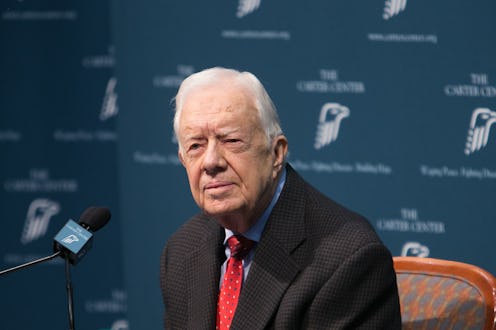News
Why Experts Think Jimmy Carter Going To North Korea Is A Bad Idea

Tensions between North Korea and the United States continue to escalate each day, and that has inspired one former U.S. president to advocate for a diplomatic approach to creating "permanent peace" between the two nations. Former President Jimmy Carter has offered to visit North Korea on behalf of the Trump Administration in an effort to establish a peace treaty, and while the administration has reportedly not been receptive to his proposition, policy experts are skeptical about whether such a visit would actually have a positive outcome.
"I would go, yes," 93-year-old Carter told the New York Times when asked if he would agree to be sent on a diplomatic mission to the isolationist regime by President Trump. He went on to say that he has talked with Trump's National Security Advisor, Lt. Gen. H. R. McMaster, to offer his assistance.
"I told him that I was available if they ever need me," Carter said.
This offer isn't entirely surprisingly, especially given Carter's unique history as a peacemaker in the region. In 1994, after Carter finished his term in office, he worked with the Clinton Administration to play an instrumental role in establishing the Agreed Framework, a treaty that, for a brief period, prevented North Korea from generating weapon-grade plutonium for nuclear weapons.
"Carter really took the lead in going over to North Korea, over some objections from the Clinton Administration, to establish the agreement," James McKeon, a policy analyst at the Center for Arms Control and Non-Proliferation, tells Bustle. "Because he went there, he met with Kim Il-Sung and other North Korean officials, and that laid the groundwork for the agreement to be officiated."
Although the agreement eventually fell apart under the Bush Administration after officials discovered that North Korea could still produce highly enriched uranium to create nuclear weapons, Carter's involvement in the region, and particularly his visit with North Korean officials in 1994, led to "substantive progress ... which for 10 years prevented North Korea from producing plutonium for a nuclear weapon," according to McKeon.
Still, though Carter had success negotiating a peace deal in the 90s, some policy experts are not convinced that his offer to make another visit would be the best option under the Trump Administration. In fact, Yun Sun, a senior associate with the East Asia Program at the Stimson Center, a think tank focuses on international peace and security, tells Bustle that Carter's attempts at brokering a peace deal could actually backfire.
According to Sun, a visit from Carter might be a sign of weakness to North Korean officials and the international community, sending a message that the regime's "provocation" is effective in influencing U.S. officials to bend to its will.
"They only have to act out to have America send the former president to North Korea, and the North Korean leader can claim, 'Look how great we are,'" Sun says. "'We are able to subdue the Americans and make them send a former president to our capitol.'"
Sun says that the fact that North Korea has made it clear that they are unwilling to negotiate on their nuclear weapons program would mean that a visit from Carter could send the message that American officials are growing desperate.
"What exactly will Jimmy Carter be negotiating about?" she says. "Is it to negotiate a peace deal? How will his intervention help us achieve the goals that we want? If his goal is to prevent a war, it takes two to tango."
Benjamin R. Young, a PhD candidate at the The George Washington University whose research focuses on modern Korea and Cold War international history, tells Bustle that he doesn't take Carter's offer "too seriously," but agrees that any attempt at diplomatic outreach by Carter could have negative consequences, and may not even be welcomed by the North Korean regime.
"I think the North Koreans would be very nervous having a 93-year-old former U.S. president come to their country," Young says of Carter, who recovered from metastatic cancer last year and was recently hospitalized for dehydration. "I don’t think that Carter, with his health or with his age, should probably go there. They wouldn’t want anything bad to happen to him — they don’t want that on their hands."
Given President Trump's heated rhetoric directed at North Korean leader Kim Jong-un, it's unlikely that he will take Carter up on his offer, or that Carter will have any opportunity to continue his diplomatic work in North Korean nearly two decades after it began. But according to McKeon, the Trump Administration could benefit from Carter's suggestion.
"President Trump could learn a lot from what Carter is trying to say, mainly that we should be talking to the North Koreans," McKeon says. "This idea that we can sanction and condemn them and hope for the best has been a colossal failure. The Trump Administration needs to have a change in course, and that should be exactly what Jimmy Carter is proposing: direct dialogue with the North Koreans."